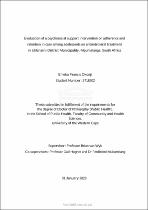| dc.contributor.advisor | van Wyk, Brian | |
| dc.contributor.author | Okonji, Emeka Francis | |
| dc.date.accessioned | 2023-02-09T07:24:24Z | |
| dc.date.available | 2023-02-09T07:24:24Z | |
| dc.date.issued | 2022 | |
| dc.identifier.uri | http://hdl.handle.net/11394/9562 | |
| dc.description | Philosophiae Doctor - PhD | en_US |
| dc.description.abstract | In 2021, it was estimated that globally approximately 1.8 million adolescents (aged 10-19
years) were living with HIV, of whom over 90% resided in sub-Saharan Africa. While the
global number of adolescents living with HIV fell by 57% from 2000 to 2020, the number of
AIDS-related deaths amongst adolescents in eastern and southern Africa increased during the
same period.
Adolescents living with HIV (ALHIV) face many challenges related to adherence to
antiretroviral treatment (ART) and remaining engaged in care. Some of these challenges
result from the physiological and psychosocial characteristics of their stage of development.
It is hypothesized that providing psychosocial support may mitigate high levels of anxiety,
fear of disclosing their HIV-positive status, low self-esteem, low self-efficacy, depressive
disorders, and suicide reported amongst adolescents living with HIV. | en_US |
| dc.language.iso | en | en_US |
| dc.publisher | University of the Western Cape | en_US |
| dc.subject | Adolescent | en_US |
| dc.subject | HIV | en_US |
| dc.subject | Public health | en_US |
| dc.subject | Mpumalanga Province | en_US |
| dc.subject | Psychology | en_US |
| dc.title | Evaluation of a psychosocial support intervention on adherence and retention in care among adolescents on antiretroviral treatment in Ehlanzeni District Municipality, Mpumalanga, South Africa | en_US |
| dc.rights.holder | University of the Western Cape | en_US |

